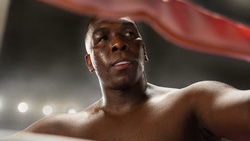For this generation, most know George Foreman as the pitchman for the insanely
successful Foreman grills. And for the slightly older crowd, he was a powerful heavyweight champion and Olympic gold medalist.
But the path taken by Foreman was an against-all-odds journey, one that will come to
the big screen this week in the debut of Big George Foreman: The Miraculous Story of
the Once and Future Heavyweight Champion of the World.
His story is one of irrational confidence to pursue dreams that defy logic, like becoming
an Olympic gold medalist in boxing a year after first picking up the sport; or becoming a
world champion, losing the title and then winning it back 20 years later.
“You see a career path, from sports to spirituality, anything is possible if you just believe
that anything you can accomplish,” said producer George Tillman Jr., whose body of
work beyond the Foreman movie includes Men of Honor (2000), Soul Food (1997),
Soul Food: The Series as well as the four films from the Barbershop series. “It’s really not cliche; it’s true. But you have to change your point of view and how you see things.
That’s how George is. That’s a great message I want to send to the audience.”
It requires an almost irrational confidence that only those in the struggle can see with
clarity, knowing that in time it’ll be apparent to others.
In the Foreman movie, that confidence in Foreman is gradually amplified by his trainer,
Doc Broadus, played by Academy Award winner Forest Whitaker.
The life of boxing legend George Foreman has been fueled by a combination of
irrational confidence and an unbreakable faith viewed through an “Anything is
possible” lens on life.
Those factors form the thread that binds the biopic on Foreman’s life which will debut
nationwide this week.
The movie stars Khris Davis, playing the role of Big George Foreman, and Academy
Award winner Forest Whitaker, as Foreman’s trainer, Doc Broadus.
Whitaker said the role was even more gratifying for him because Foreman was a hero
of his as a child. Beyond that, he said the dynamic that existed between his character and
Foreman’s character was what ultimately sold him on this being a project he wanted to be part of.
“I like the relationship between (Broadus) and (Foreman),” Whitaker said. “Working
on and figuring out how to … bring this kid to his destiny was something interesting to
play. I was excited to try.”
But the linchpin to the movie’s feel-good vibes and messaging overall was Davis.
One of the common themes throughout the movie centers around Foreman’s
continued evolution, in terms of his boxing and faith.
And like so many of us, once Foreman moved past his fighting days, he added a few
pounds. That too was reflected in the movie in as authentic a manner as possible, with Davis
adding several pounds and later shedding the weight.
“That was the key, for us to be as authentic as possible, down to the fights, the
auditoriums and the stadiums he fought in,” said Tillman Jr. “The main thing was,
how do we sell Big George and Young George.
Tillman added, “I wanted an actor who could do both. That means I would have had to
have three actors; an actor to play Big George, middle and a kid. I needed someone
who could play 16 [year-old Foreman] and go up to 46.”
Davis makes the transition into and out of the various weight classes for the role look
seamless.
During the making of the movie, Tillman Jr. carved out six weeks for Davis to add the
necessary weight to look the part of Foreman in the latter stage of his boxing career.
He said the idea came to him while working with Robert De Niro in Men of Honor. “[De Niro] told me that in making Raging Bull, they took a break. He went to Italy; he ate every Italian food.”
Davis endured a similar all-you-can-eat mindset for six weeks.
“When I saw him, I couldn’t believe it,” Tillman Jr. said. “[Davis] shaved the head,
the belly was out. That commitment that he promised, and I promised him, was there.
I was so happy that we were able to accomplish this.”
And those who check out this movie will, if anything, be encouraged by Foreman’s
journey which was filled with its share of heartbreak.
But through those tough times, Foreman developed a toughness that went beyond the
physical. Through the adversity, Foreman’s hope for a better life and better times, only grew stronger.
And in the movie, we see this play out inside the ring with his boxing, and outside of it
with his transition to being a pastor and later, as one of the world’s most recognizable
product endorsers.
Hope.
Faith.
Anything is possible.
“Messages of hope are always important, messages that you can overcome obstacles
and still achieve your dreams,” Whitaker said. “When you falter, it doesn’t mean you
quit. It means you readjust and try to find your way. That’s really important
messaging. I’m glad to be part of that storyline. I think right now, people need that.”



